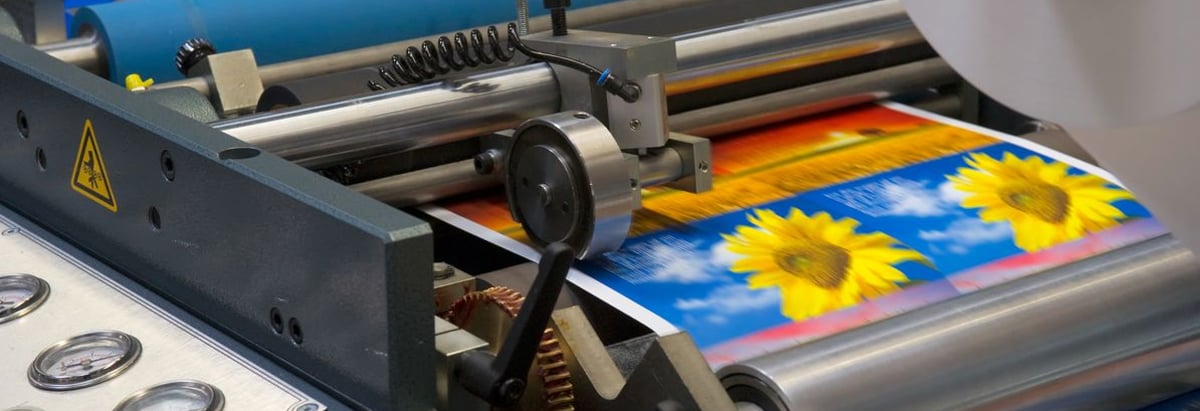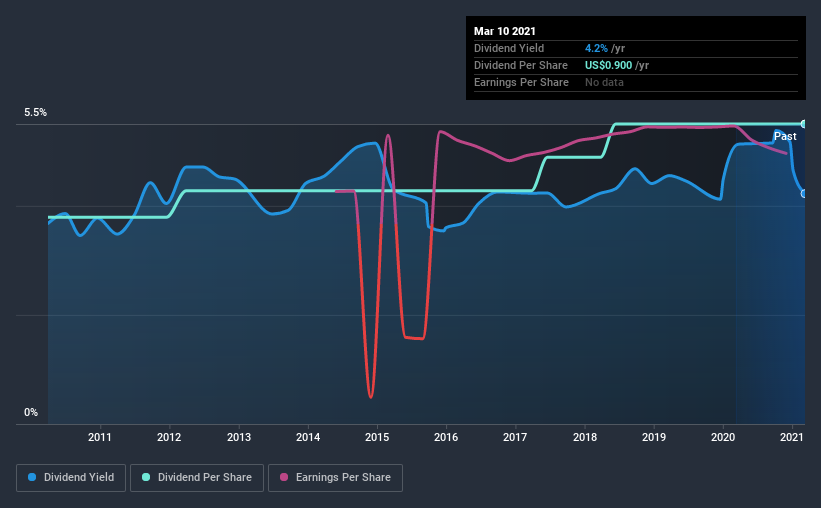- United States
- /
- Commercial Services
- /
- NYSE:EBF
Is Ennis, Inc.'s (NYSE:EBF) 4.2% Dividend Worth Your Time?

Is Ennis, Inc. (NYSE:EBF) a good dividend stock? How can we tell? Dividend paying companies with growing earnings can be highly rewarding in the long term. On the other hand, investors have been known to buy a stock because of its yield, and then lose money if the company's dividend doesn't live up to expectations.
With Ennis yielding 4.2% and having paid a dividend for over 10 years, many investors likely find the company quite interesting. We'd guess that plenty of investors have purchased it for the income. There are a few simple ways to reduce the risks of buying Ennis for its dividend, and we'll go through these below.
Explore this interactive chart for our latest analysis on Ennis!

Payout ratios
Dividends are typically paid from company earnings. If a company pays more in dividends than it earned, then the dividend might become unsustainable - hardly an ideal situation. As a result, we should always investigate whether a company can afford its dividend, measured as a percentage of a company's net income after tax. Ennis paid out 85% of its profit as dividends, over the trailing twelve month period. Paying out a majority of its earnings limits the amount that can be reinvested in the business. This may indicate a commitment to paying a dividend, or a dearth of investment opportunities.
Another important check we do is to see if the free cash flow generated is sufficient to pay the dividend. Ennis' cash payout ratio in the last year was 47%, which suggests dividends were well covered by cash generated by the business. It's positive to see that Ennis' dividend is covered by both profits and cash flow, since this is generally a sign that the dividend is sustainable, and a lower payout ratio usually suggests a greater margin of safety before the dividend gets cut.
With a strong net cash balance, Ennis investors may not have much to worry about in the near term from a dividend perspective.
Consider getting our latest analysis on Ennis' financial position here.
Dividend Volatility
Before buying a stock for its income, we want to see if the dividends have been stable in the past, and if the company has a track record of maintaining its dividend. For the purpose of this article, we only scrutinise the last decade of Ennis' dividend payments. The dividend has been stable over the past 10 years, which is great. We think this could suggest some resilience to the business and its dividends. During the past 10-year period, the first annual payment was US$0.6 in 2011, compared to US$0.9 last year. This works out to be a compound annual growth rate (CAGR) of approximately 3.8% a year over that time.
While the consistency in the dividend payments is impressive, we think the relatively slow rate of growth is unappealing.
Dividend Growth Potential
Dividend payments have been consistent over the past few years, but we should always check if earnings per share (EPS) are growing, as this will help maintain the purchasing power of the dividend. In the last five years, Ennis' earnings per share have shrunk at approximately 5.2% per annum. A modest decline in earnings per share is not great to see, but it doesn't automatically make a dividend unsustainable. Still, we'd vastly prefer to see EPS growth when researching dividend stocks.
Conclusion
When we look at a dividend stock, we need to form a judgement on whether the dividend will grow, if the company is able to maintain it in a wide range of economic circumstances, and if the dividend payout is sustainable. First, we think Ennis has an acceptable payout ratio and its dividend is well covered by cashflow. Second, earnings per share have actually shrunk, but at least the dividends have been relatively stable. While we're not hugely bearish on it, overall we think there are potentially better dividend stocks than Ennis out there.
Companies possessing a stable dividend policy will likely enjoy greater investor interest than those suffering from a more inconsistent approach. Still, investors need to consider a host of other factors, apart from dividend payments, when analysing a company. Now, if you want to look closer, it would be worth checking out our free research on Ennis management tenure, salary, and performance.
We have also put together a list of global stocks with a market capitalisation above $1bn and yielding more 3%.
When trading Ennis or any other investment, use the platform considered by many to be the Professional's Gateway to the Worlds Market, Interactive Brokers. You get the lowest-cost* trading on stocks, options, futures, forex, bonds and funds worldwide from a single integrated account. Promoted
Valuation is complex, but we're here to simplify it.
Discover if Ennis might be undervalued or overvalued with our detailed analysis, featuring fair value estimates, potential risks, dividends, insider trades, and its financial condition.
Access Free AnalysisThis article by Simply Wall St is general in nature. It does not constitute a recommendation to buy or sell any stock, and does not take account of your objectives, or your financial situation. We aim to bring you long-term focused analysis driven by fundamental data. Note that our analysis may not factor in the latest price-sensitive company announcements or qualitative material. Simply Wall St has no position in any stocks mentioned.
*Interactive Brokers Rated Lowest Cost Broker by StockBrokers.com Annual Online Review 2020
Have feedback on this article? Concerned about the content? Get in touch with us directly. Alternatively, email editorial-team (at) simplywallst.com.
About NYSE:EBF
Ennis
Manufactures and sells business forms and other business products in the United States.
Flawless balance sheet 6 star dividend payer.
Similar Companies
Market Insights
Community Narratives




